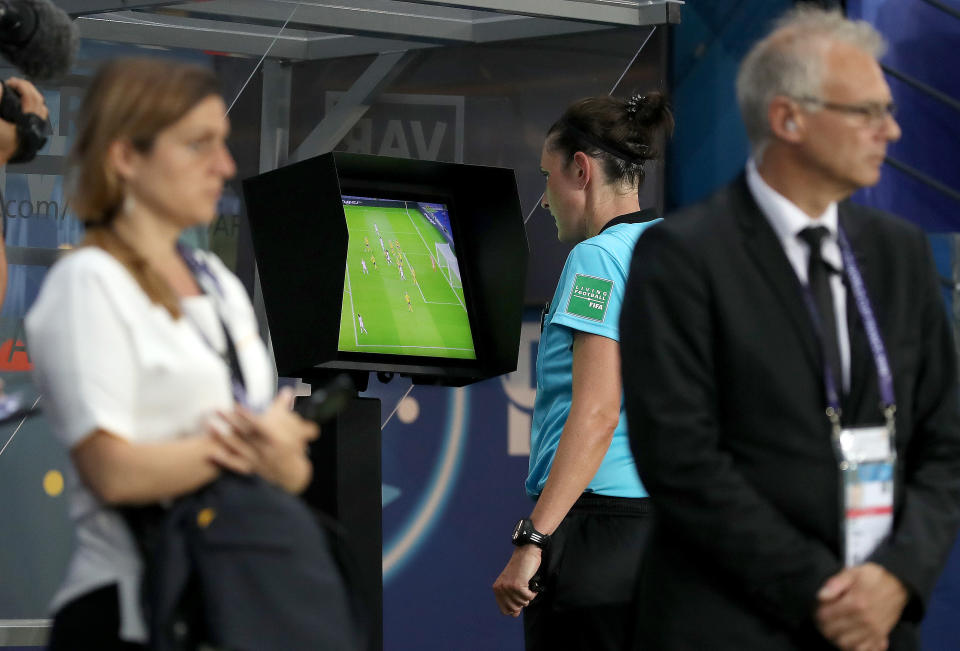Ex-England captain calls for more men to officiate Women's World Cup in wake of VAR issues
The 2019 FIFA Women’s World Cup has been marred in part by VAR, whether it be through a changed call or long delays that have broken up momentum and created seven-plus minutes in stoppage time every half.
The result of officiating in the tournament is an increased call for a mixture of men and women in the officiating ranks, rather than the tradition of solely women officiating the Women’s World Cup.
White: Men needed to ref at Women’s World Cup
The frustration with refs and VAR at the Women’s World Cup continues to grow with every match.
Former England defender Laura Bassett said referees were using VAR “as a comfort blanket” during a TV spot on BBC Two in the group stage. Though a penalty or call is clear to all on the pitch, referees are commonly reviewing it anyway. It’s interrupting the match and creating necessary pauses in play.

Former England captain Faye White took it a step further and asked for more male referees so that the game had better refs all around.
“I don't see why it has to purely be women referees at the tournament. That applies to the men's game too. It is harder for women to break into the men's game because it is more saturated. But at the World Cup, it should be the best referee for the job. There are some brilliant female referees and some brilliant male referees.”
Her call for more male referees is to ensure the women’s game has the best possible officials — another equality issue — but it brings more to light in terms of why there are no male refs and how FIFA created this particular issue in 2019.
Why there are no male refs at Women’s World Cup
In 1995, FIFA instituted a female-only ref rule in the women’s game. Breaking into the ranks of the men’s game as an official is difficult and the rule opens up spots for women’s involvement.
Individual confederations nominate women to become officials at the World Cup. FIFA then makes a decision over a three-year period based on consistency interpreting rules, technical expertise and ability to understand the game. The organization announced its decision of 27 referees and 48 assistants in December 2018. They come from 42 different countries.
The result is refs who may not have extensive experience at a high level in high-intensity situations who are now running the biggest tournament in the game. Officiating a US-France contest is not the same level as Chile vs. Thailand.
And this year it ran into another problem. With VAR implemented in March there were no female video assistant refs trained in the technology.
All 15 video review assistants are therefore men who are trained in VAR. But the women making calls on the field only had a boys Under 17 tournament in Qatar to work with the technology.
World Cup ref issue is more about VAR experience
Manchester United Women manager Casey Stoney, a former center back for England, also took a hard stance against VAR and the referees, telling BBC Sports she was “questioning the ability of the officials in this tournament.”
"Where are these referees doing their job week in, week out? It needs to be the best person for the job to give these players an opportunity to play their football. I want to talk about the football, not the VAR decisions."
The ability of the tournament’s officials is, objectively, not as strong as it could be. FIFA put the referees and the women’s game in a tough spot when it approved VAR for the Women’s World Cup in March, a mere three months before the start of the tournament. It came after a continued call for its use from players and coaches after the men used it previously.
FIFA then instituted its annual rule changes and clarifications on June 1 — less than a week before the first match. It enforced the goalkeeper encroachment rule on penalty kicks and allowed VAR to be used to see if a keeper has at least one foot on the line.
The largest issue with VAR is its overuse, called for by refs on the pitch. A few referees in France have experience officiating in the top men’s leagues. For the majority there is a lack of time officiating in front of thousands at high stakes. And zero experience doing so with VAR.
More from Yahoo Sports:

 Yahoo Sports
Yahoo Sports 